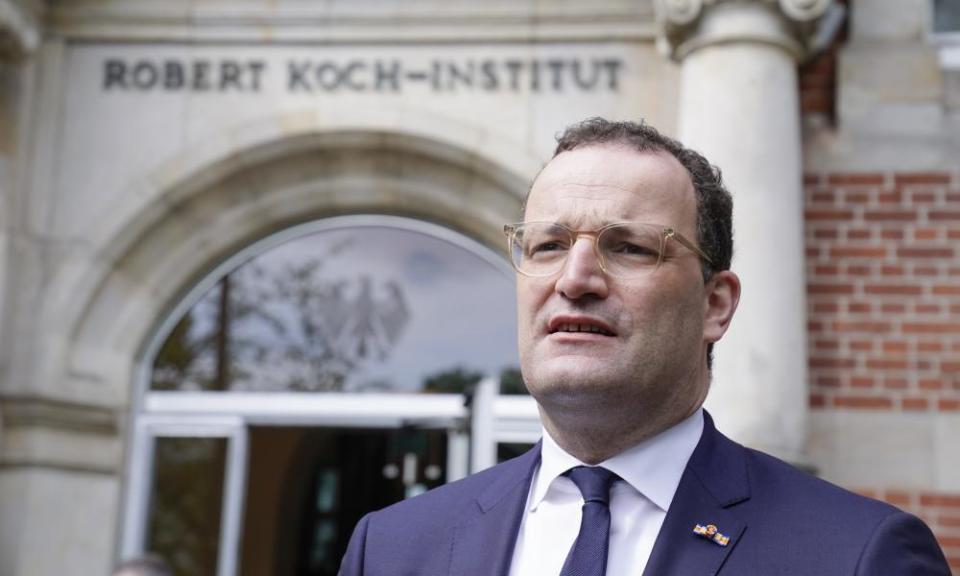German minister’s plan to place restrictions on unvaccinated criticised

Plans by Germany’s health minister to place restrictions on Germans who have not been vaccinated against coronavirus are facing stiff resistance from his coalition partners and the opposition.
Several Social Democratic party (SPD) politicians have called Jens Spahn’s proposals to exclude people from restaurants, gyms and other facilities who had failed to take up a vaccine offer “unworkable” and say they risk undermining the public health campaign to dampen the spread of the virus.
Spahn’s ministry put forward the proposals before a meeting of the federal government and leaders of Germany’s 16 states next week. He has argued the measures are necessary to control a fourth wave.
The infection rate has been rising steadily in Germany for the past month. At the same time, take-up of the vaccine has slowed to a rate that the target of having 75% of the population vaccinated by the autumn is unlikely to be met.
By Thursday, just under 54% of Germans were fully vaccinated while 62% had received at least one jab.
Spahn tweeted: “Getting a vaccine is a patriotic act: you are not only protecting yourself, but all of us as a society.”
He has advocated a so-called “3G” approach, whereby only those who are vaccinated (geimpft), tested (getestet) or recovered from the virus (genesen) may dine in a restaurant, go to a gym or hairdressers, or participated in other activities. In the event of the infection rate worsening to the extent that the health system is under threat, the government would reserve the right to reduce access to activities just to those who are vaccinated or have had the virus (so-called 2G).
Spahn has proposed retaining the current rules, such as the wearing of medical masks in public spaces including shops and transport, social distancing and the airing of work and school spaces, at least until next spring.
From October, people should be charged for antigen tests that until now have been available for free, he has said.
Leading criticism of Spahn’s plans, the head of the north-eastern state of Mecklenburg-Vorpommern, Manuela Schwesig, said they amounted to threats she did not think would encourage people to get vaccinated. “Instead, we need to convince people,” she said.
Dietmar Woidke, the leader of the eastern state of Brandenburg, said those who tested negative should still be allowed to take part in events and gatherings. “No one should be excluded,” he said.
Andreas Bovenschulte, the mayor of the northern city of Bremen, said the plans were irresponsible. “I think it is wrong and legally invalid to exclude those who are not vaccinated from public life,” he said.
Spahn sought to clarify his plans, which were leaked to major news organisations, in a newspaper interview published on Thursday.
“For essential things, such as travel on public transport, going to the town hall, or a hospital visit, it must be possible to do so only with a mask or a test,” he told the Münchner Merkur. “But for discos, stadium visits or going to the theatre, that is to say places that are not vital to basic needs, I can only imagine entry being possible for those who are vaccinated or tested.”
Spahn posed the idea of offering limited access to some venues, for those who are unvaccinated. “So for example, a football match at a stadium in Bavaria to which 30,000 are vaccinated, could also allow 2,000 people who have undergone a test to be present,” he said.
If the plans were implemented, they would be among some of the strictest in Europe. Governments in France and Italy have introduced similar restrictions for which they have been heavily criticised.
Christian Lindner, the head of the pro-business Free Democratic party, which was the first party to publicly criticise the plans, told Die Welt: “Those who are not vaccinated or recovered should be able to partake of normal societal life, as long as they produce a negative test result valid for that day. Anything else would amount to a disproportionate restriction of freedom.”
He said regional differences in the infection rate, meant it would be “wrong to tar the whole country with the same brush”.

 Yahoo Finance
Yahoo Finance 